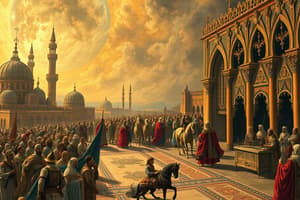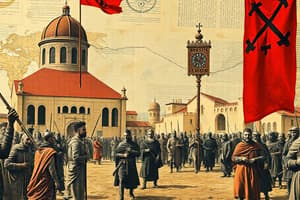Podcast
Questions and Answers
What was the primary religious motivation behind the Crusades?
What was the primary religious motivation behind the Crusades?
- Desire to weaken Byzantium
- Muslim Turks' appeal for help
- Christian zealotry and the desire to reclaim Jerusalem (correct)
- Desire for political power
Which event catalyzed the Crusades by Pope Urban II's appeal for military support?
Which event catalyzed the Crusades by Pope Urban II's appeal for military support?
- Pope Urban II's excommunication
- The Battle of Jerusalem in 1076
- The Council of Clermont in 1095 (correct)
- The Seljuk Turks' invasion of Constantinople
What role did political power struggles play in the origins of the Crusades?
What role did political power struggles play in the origins of the Crusades?
- No role at all
- Only a minor role
- The primary role
- A significant role (correct)
Why did European rulers support the First Crusade?
Why did European rulers support the First Crusade?
What was a major cause of growing hostility towards Muslim rule in Holy Land territories?
What was a major cause of growing hostility towards Muslim rule in Holy Land territories?
'Rise of Islam' as a cause of the Crusades refers to:
'Rise of Islam' as a cause of the Crusades refers to:
Flashcards are hidden until you start studying
Study Notes
Causes of the Crusades
The Crusades were a series of religious wars fought between Christians and Muslims from the early eleventh century through the late thirteenth century. These conflicts arose due to several intertwined factors, including political rivalries and religious differences. Some key causes included:
Religious Motivations: At their core, the Crusades were driven by Christian zealotry and the desire to reclaim Jerusalem and other holy sites. This was especially true after the emperor of Byzantium requested help against Muslim Turks in 1095. A major event that catalyzed these endeavors was Pope Urban II's appeal for military support of the Eastern Orthodox Church at the Council of Clermont in 1076.
Political Hostilities: Political power struggles also played a significant role in the origins of the Crusades. In Europe, there had been growing hostility toward Muslim rule over Holy Land territories since the seventh century. Further regional tensions rose when the Seljuk Turks took control of most of Anatolia, central Turkey, and parts of Syria and Iraq in the mid-eleventh century. European rulers sought to weaken Byzantium and gain access to eastern markets; hence, the First Crusade was seen as fulfilling both religious and commercial goals.
Rise of Islam: The rapid spread of Islam during this period created fear among Christians who saw it as a threat to Christendom. One of the main reasons behind the crusades is thought to have been a response to the perceived threat posed by the expansion of Islamic lands into regions once under Christian domination, such as Palestine, Egypt, and part of southern Italy.
Papal Authority: The Papacy hoped to restore its influence within Christianity by instigating a campaign against those who did not accept papal authority. Furthermore, popes believed they could increase their own powers if they succeeded in converting non-Christians or capturing Jerusalem.
In summary, while religion was a primary motivator, the causes encompass more complex political dynamics including fears of Islamic military gains, the need to assert papal primacy, and economic concerns over trade routes with Asia.
Studying That Suits You
Use AI to generate personalized quizzes and flashcards to suit your learning preferences.






